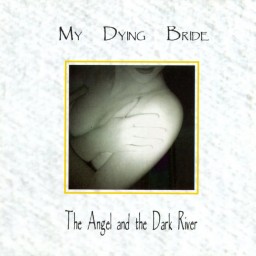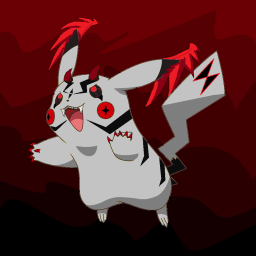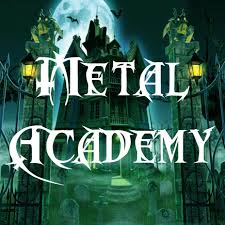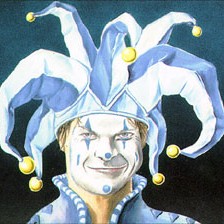Reviews list for My Dying Bride - The Angel and the Dark River (1995)
On their third album, My Dying Bride pretty much perfected the Gothic Doom style, leaving all of their Death Doom roots behind for a melodic and mournful masterpiece. Seeing as how the growls are gone, vocalist Aaron had to really find his cleans here, and they are pleasantly somber and melodramatic throughout.
The opening track is an easy highlight, with a roaring wall of guitar lead by marching piano scales that add a great urgency to the song, while Aaron’s vocals on the other hand sound entirely devoid of life. The album remains quality throughout, with more standard Gothic Doom songs making up the meat of the album. It ends on another fantastic note, “Your Shameful Heaven,” easily the most energetic and aggressive song here. The band goes from depressive to disturbing as both riffs and lyricism take on a more evil atmosphere, finishing the album off in triumphant darkness.
This thing became the standard against which Gothic Doom was measured, and for good reason. Every track here is of great quality, but there’s still decent variation running throughout. A fantastic run through negative emotion in a mature and poetic package.
I simply can’t understate the impact that West Yorkshire-based death doom metal outfit My Dying Bride had on a young & impressionable teenage me between 1992 & 1995. I’d discovered them very early in their recording career through their debut E.P. “Symphonaire Infernus Et Spera Empyrium” & had simply fallen in love at first sight/listen. Paradise Lost had already opened me up to the delights of death metal infused doom by that stage but the addition of grandiose violin/symphonics & a more consistent achievement of pure melancholy put My Dying Bride in front of them for me & the next few years would see my affiliation with the band only strengthening with 1994’s “Turn Loose The Swans” representing not only the absolute peak of that sound but also a pivotal moment in my musical evolution. So needless to say that the band were facing a huge challenge to follow that album up with something that would gain the same level of adoration from this stubborn metalhead but 1995’s “The Angel & The Dark River” would prove to be just what the doctor ordered, perhaps not in the way that I was expecting though.
“The Angel & The Dark River” represents a noticeable change of direction for My Dying Bride & over time it would prove to be one that would see them achieving the critical & commercial breakthroughs they’d been hoping for. Upon first listen it becomes immediately obvious that the album is significantly less imposing than the band’s previous material with the death metal component having been completely dropped with the exception of the bonus track that appears on some versions of the album. There’s a much stronger gothic streak running right through the centre of the tracklisting with front man Aaron Stainthorpe opting for a clean & considerably mournful delivery that reminds me of many an early 80’s goth rock outfit, minus the trademark lower registers that were so commonly employed in that scene. Aaron’s clean voice certainly seemed compelling enough during my first couple of listens &, despite the fact that I don’t find this approach to be anywhere near as exciting as Aaron’s inimitably dark death growls, I found myself going along for the ride to see where it’d take me. Looking back, I find it hard to believe that I didn’t experience any initial feelings of disappointment & dismay at this new vocal development but perhaps it’s just a sign that I was in a very enlightening time of my musical development where I was very receptive to new & adventurous sounds.
But it’s not just the vocal approach that changed with “The Angel & The Dark River” because My Dying Bride had made some less obvious instrumental adjustments too with all traces of their death metal roots having been shelved in order to open the door for a more melodic & inherently goth-tinged traditional doom metal sound that helped to highlight Aaron’s miserable odes to loss & disconsolation. The use of traditional goth tools such as piano, organ & symphonics are used tastefully to apply colour & highlights which give the material an added layer of melodic content & apply a nice contrast to Aaron’s quite insular & sorrowful performance. I have to admit that some of these elements do sound a touch dated by today’s standards, particularly the synthesized piano & electric violin sounds which were very much of their time, however the quality of the riffs & arrangements are strong enough to see those minor qualms being less significant than they might otherwise have been & all band members sound revitalized & right onboard with My Dying Bride’s new direction. Despite the limitations of the production tools I just mentioned, multi-instrumentalist Martin Powell (who handles the violins & keyboard) puts in a stellar performance which sees him pulling on my heart-strings at key moments whilst always maintaining a level of subtlety & sophistication & this is an element that was missing from some of My Dying Bride’s later works.
“The Angel & The Dark River” kicks off in emphatic fashion with two incredible examples of My Dying Bride’s new style. Epic opener “The Cry of Mankind” sees the band employing some interesting production techniques in the studio with the same continuous four-note finger-tapped guitar melody played repeatedly over the entire twelve minute duration & the use of an extended ambient section being refreshing inclusions. The quality drops back a touch for the middle part of the album which is still strong but lacks the sense of timelessness that the earlier tracks seemed to possess in spades. “Two Winters Only” then picks things up in a major way & represents not only the most stripped back track on the record but also the clear highlight in my opinion. It features the albums most introspective & heart-wrenching moments & the contrast of the clean, melodic guitar lines & chuggy church organ driven heavy sections is both stark & refreshing. Closer “Your Shameful Heaven” begins with probably the most beautiful & melancholic part of the record with Powell opting for a stunning solo violin part that transports the listener back to dark medieval times however the tempo increases drastically through the middle of the song to see it becoming the most bouncy & energetic number on the tracklisting, a fact that I find a little disappointing if I’m honest, despite my strong affiliation with the intro.
At this point I think I have to fess up that the version of the album I purchased immediately upon release was the one with the bonus track “The Sexuality Of Bereavement” i.e. a ridiculously dark death doom metal piece that draws inspiration from My Dying Bride’s earlier material & I believe was actually recorded during the "Turn Loose The Swans" sessions. Why is this so important to mention? Well, I have to admit that I think this track is not only a cut above the rest of the tracklisting but is also the clear high point of the band’s entire career for me personally. The sheer depressive grandiosity of this track is almost immeasurable & is further accentuated by the intelligent & artistic use of backwards reverb & decay on the drums. Why the band & its management have opted not to include this track on this or any other album is absolutely beyond me because it doesn’t sound so drastically out of place amongst the rest of the material that it compromises the flow of the album. If anything it’s only caused me to rate the overall album more even more highly than I already did & I just feel that it’s one of the world’s great travesties that some fans have had to go without this track for over twenty-five years & are probably none the wiser.
Regardless, “The Angel & The Dark River” is a fine example of an extreme metal band successfully reinventing themselves whilst losing none of their underground credibility. If I’m being particularly picky, I do find Aaron’s clean vocals to be a bit whiny & repetitive these days but this wasn’t such a big deal when I only had this record to contend with & the concept was still so fresh in my mind so I’m pleased to see that it hasn’t tainted my feelings whatsoever. I can’t deny the emotional attachment I have with these songs after all these years & will always remember the sense of strength & empowerment they gave me during some of the more challenging times of my life. Do I rate “The Angel & the Dark River” as highly as My Dying Bride’s previous album “Turn Loose The Swans”? Probably not these days but I certainly did back in the 90’s & that’s hardly a huge criticism given how highly I rate that particular album. This should be essential listening for all fans of gothic doom metal.
For fans of Paradise Lost, Type O Negative & The Foreshadowing.
P.S. Sorry to do this to you but is it just me or does the cover photo sit slightly further over to one side of the cover than it does to the other?
A beautiful album that brought My Dying Bride to a wider audience without shedding their identity.
You can always tell that a band is making a transition towards a new style when they change their logo. The fact that The Angel and the Dark River contained an at least half naked woman on the cover wasn’t particularly surprising. After all, both As the Flower Withers and The Thrash of Naked Limbs contained nudity in some form on their front display. What was particularly noticeable when viewing this release for the first time, was that the eerie, death metal themed logo that had adorned previous My Dying Bride albums had been replaced with a far more conventional font. This alteration alone suggested that The Angel and the Dark River might find the band attempting to reach a broader audience, and what better way to do that than to shed their ties to death metal. This was a very scary idea for me personally, as the band’s previous full length Turn Loose the Swans was (and still is) one of my absolute favourite albums of all time. I didn’t want them to change. I wanted more of the incredibly atmospheric death doom that was built around haunting riffs, crushing drums and violin romanticisms. Disappointment seemed to be the only result possible if the band had indeed taken this route. It took approximately 90 seconds of opening track The Cry of Mankind to know that I was about to be convinced otherwise.
I should have known better too, as both the opening and closing tracks off Turn Loose the Swans (Sear Me MCMXCIII and Black God) were amazing despite not containing guitars or drums in the slightest. These Brits seem capable of creating melancholic magic at will and they’ve done so consistently throughout their existence while still attempting to expand and evolve their sound. This is the album where they were confident enough to base their song structures around Martin Powell’s keyboard and violins rather than using him as simply a finisher. The Cry of Mankind is such a stunning track that starts off with the simplest of melodies before building up to a gorgeous orchestra of doom riffs, cascading drums, deep crooning vocals and exquisite piano. Not satisfied with the obvious genius of all the above, the track eventually breaks back down to only the original melody (the one you’d probably hadn’t noticed was continuing through the whole track), before fading out into ambient bliss complete with distant horns. It’s My Dying Bride at their best and it’s hard to imagine how the rest of the album could possibly be this impressive. As it turned out I’m not sure that it ever reaches these heights again (at least not the official release but more on that later), but it’s still nothing short of excellent.
From Darkest Skies is where fans first experienced Aaron at his most weepy and sorrowful. After years of listening to his aggressive death growls and deep clean vocals, this theatrical attempt at melancholy certainly took some getting used to. Fortunately for Aaron, the music is so deeply despondent and doom filled that his naked attempts at vulnerability work perfectly well in this environment. I should point out that he’s by no means limited to one style, varying his vocals throughout the album to fit the mood. I think his performances on later albums would sound a bit less awkward, but he’s nothing short of captivating throughout The Angel and the Dark River. After having such a powerful influence on the opening track, the piano doesn’t resurface for the rest of the album, with Martin utilising the violin instead. Every track has beautiful moments of exquisite melancholy and while Your Shameful Heaven’s guitar driven finale could be considered upbeat, this is one of the more depressive albums you’ll come across. Two Winters is another highlight with a really tender acoustic foundation combined with Aaron’s heartfelt vocals and Martin’s violin making for an almost overwhelmingly touching experience. Aaron has stated in interviews that this track is his favourite of all My Dying Bride’s work and it’s unquestionably one of the most moving.
There is one thing that makes rating The Angel and the Dark River a bit perplexing for me. Back in 1995 I purchased this album in the digipak form, which had The Sexuality of Bereavement as a bonus track. I think it would be at least ten years before I would be informed that this track was not actually part of the album the way it was originally intended. Yes, it did always seem a bit strange to me that there would be a huge death doom track complete with death growls to finish an album where the band had moved away from that sound, but the album sleeve made no mention of it being bonus material so I just took it as part of the package. The thing is...I think The Sexuality of Bereavement could very well be my favourite My Dying Bride track ever! It’s immensely emotionally moving and I don’t think the band integrated violins into their death doom any better than they did on this track. To me, The Sexuality of Bereavement will always be part of The Angel and the Dark River, and nowadays it’s a bonus track on every subsequent re-releases of the album. If I rate this album with its inclusion, I can’t give it anything but full marks. Without it...well, it just falls short due to my personal preference towards the band’s death doom material. It’s a beautiful album though that I listen to regularly and one that brought multitudes of new fans into contact with one of metal’s most esteemed bands.


 SilentScream213
SilentScream213
 Daniel
Daniel
 Ben
Ben